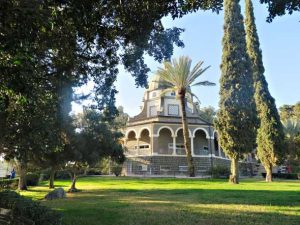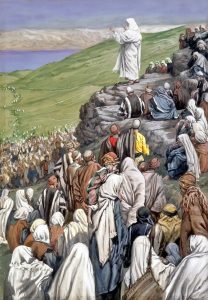3 “Blessed are the poor in spirit, for theirs is the kingdom of heaven.
4 “Blessed are those who mourn, for they will be comforted.
5 “Blessed are the meek, for they will inherit the earth.
6 “Blessed are those who hunger and thirst for righteousness, for they will be filled.
7 “Blessed are the merciful, for they will receive mercy.
8 “Blessed are the pure in heart, for they will see God.
9 “Blessed are the peacemakers, for they will be called children of God.
10 “Blessed are those who are persecuted for righteousness’ sake, for theirs is the kingdom of heaven.
11 “Blessed are you when people revile you and persecute you and utter all kinds of evil against you falsely[a] on my account. 12 Rejoice and be glad, for your reward is great in heaven, for in the same way they persecuted the prophets who were before you. [Matthew 5:3-12, NRSV]
1. The octagonal Church of the Beatitudes, the traditional location for the Sermon on the Mount; 2. James Tissot, The Beatitudes Sermon, c. 1890, Brooklyn Museum.
On the northwestern shore of the Sea of Galilee and on the southern slopes of the Korazim Plateau, located between Capernaum and Gennesaret, is the traditionally recognised site of the Mount of Beatitudes where Jesus is believed to have delivered the Sermon on the Mount (Matthew 5:1-7:28). Within sight are the scenes of many of the Gospel events that relate Jesus’ ministry in Galilee.
The Church of the Beatitudes is located right here, near Tabgha. Pilgrims commemorate the event of Jesus teaching the Sermon on the Mount at the eight-sided Church of the Beatitudes, built on the slope of the mount. The church is an elegant octagonal building with colonnaded cloisters. The eight sides of the church represent the eight beatitudes, which are additionally shown in Latin in the upper windows. The seven virtues (justice, charity, prudence, faith, fortitude, hope and temperance) are depicted by symbols in the mosaic floor.
This area is one of the most beautiful and serene places in the Holy Land. The Church is surrounded by a lush green garden dotted with date-palms and cypress trees, and carpeted with scented flowers. In the landscaped garden, a few altars are provided for small group worship.
Mr. Murad, our tour guide, made it a point to brief us on the excellent accommodation right here which we might consider for our future Holy Land pilgrimage trips. It is a guest house managed by the Franciscan Missionary Sisters of the Immaculate Heart of Mary (I.H.M.). The place is a 78-room guest house described as “oriented to pilgrim tour groups and travelers seeking uniquely Catholic accommodations with a strong spiritual connection.” Each room is essentially a suite with desk and TV area, private bathroom, and bedroom. Location-wise, it is faultless as it overlooks the Sea of Galilee. For facilities, it offers full board, with immaculately clean rooms and excellent food. Pilgrims not only stay there during their entire Holy Land pilgrimage, paying a much lower price compared to the hotels, they also enjoy study, prayer, and retreat facilities in the midst of superb settings of beauty and peace.
Of this Franciscan Hostel, James Martin, SJ, writes in Jesus: A Pilgrimage: “Blessed were we to be staying at the Mount of Beatitudes hostel. Not simply because of the air-conditioned rooms, the titanic breakfasts, the proximity to so many sites in Galilee, or even the gracious Franciscan hospitality, but something else: the ease of prayer. Whenever we emerged from our hotel we stepped on holy ground: the spot where Jesus, by tradition, preached the Beatitudes during his Sermon on the Mount…”
Reflection:
It is easy to put the label of “peace” to Jesus’ Beatitudes and Sermon on the Mount. In so doing, it is at the same time, so easy to ignore the radicality of Jesus’ message. Combining peace and radical message brings out pointers for reflection.
1. Disciples’ righteousness must exceed that of the scribes and Pharisees
The Sermon on the Mount, summarizing as it were the fundamental teachings of Jesus, opens with his proclamation of the eight beatitudes, beginning with “Blessed are the poor in spirit, for theirs is the kingdom of heaven . . . .” (Matthew 5:3). The sermon indicates how Jesus’ followers, described as “the salt of the earth”, shall live so that they will be in right relationship with God and with others. These Beatitudes sound pretty gentle, and the beautiful and serene atmosphere of the locale, as we have seen above, which has been traditionally identified as the place where these Beatitudes were preached by Jesus, can both be misleading. The truth of the matter is, during Jesus’ time, he had an ongoing unhappy confrontation with a Judaism dominated by the scribes and the Pharisees. Given the legitimate authority of the scribes and the Pharisees who, however, do not practise what they preach, the Matthean Jesus tells his disciples: “For I tell you, unless your righteousness exceeds that of the scribes and Pharisees, you will never enter the kingdom of heaven” (Matthew 5:20). No wonder Matthew presents Jesus as insisting thus:
- The scribes and the Pharisees sit on Moses’ seat; so practise and observe whatever they tell you, but not what they do; for they preach, but not practise (Matthew 23:2-3).
If we tend to take Jesus’ words as calm and soothing, it is because that makes life in Christian discipleship easier. We end up neglecting that Jesus’ words are as radical and demanding as they are revolutionary and countercultural. In calling Israel to a new way of life, Jesus is calling all who would follow him to this new kingdom-way of life. And, that kingdom-way of life must look different, taste different, and concretely different from the life-style and behavior of the “legitimate” religious leaders!
2. Disciples need to nuance the Law as Christ did
We all know that Matthew presents Christ differently from other Gospel writers. The Matthean Christ is the New Moses, the New Lawgiver par excellence. He does not disregard or abolish the former law but to fulfill it (Matthew 5:17). Furthermore, in Matthew’s community, there is a mixture of rich and poor people. The Matthean Christ is therefore much nuanced, showing careful sensitivity to the concrete issues facing his hearers. This Matthean Christ nuances the Law for his audience. As a result, we see clear differences in the emphases placed by Matthew in the Sermon on the Mount (Matthew 5-7) and by Luke in the parallel Sermon on the Plain (Luke 6:20-26).
- The Lucan Jesus is harsh on the wealthy, for he specifically curses the rich and those who have their fill, while he blesses those who are poor and hungry (Luke 6:20-25). In contrast, Matthew’s style is not harsh on the wealthy at all. While it is true that delight in riches can suffocate the fruitfulness of the Word of God (Matthew 13:22), so that the rich will surely find it hard to enter the kingdom of God, but with God all things are possible (Matthew 19:23, 26). So, Matthew preaches a definitive chance for the rich, in that if they are not poor in fact, they can be poor in spirit. Matthew offers a very concrete pastoral encouragement, and that is, it is not just the poor, but the poor in spirit, who are blessed (Matthew 5:3, compare Luke 6:20).
- Similarly, it is not just the hungry, but those, if they are not physically hungry, but who hunger and thirst after justice, they are included under Jesus’ beatitudes as well. They too, will receive their fill (Matthew 5:6, compare Luke 6:24).
This having been said, a point that remains less well understood is that the Matthean Christ is by no means presenting the Beatitudes as virtues or meritorious conditions.
Rather, the Beatitudes are proclamations that communicate to the hearers that many are blessed in spite of the deplorable conditions in which they find themselves because the kingdom of heaven has been opened even to them by Jesus Christ. In other words, Jesus has opened the kingdom of heaven to all believers, regardless of status and conditions. One state does not automatically grow into the other; still less is the one the reward of the other. The key is the link, and the link is Jesus Christ who has opened the kingdom of heaven to all who believed him. That is the meaning of Jesus saying at the outset, “Repent, for the kingdom of heaven is at hand” (Matthew 4:17).
In the Beatitudes, then, Jesus of Nazareth is teaching all that the rule of God from the heavens truly is available in life circumstances that are beyond all human hope. And there, we see Jesus continuing in the Old Testament theme of status-inversion which we read in “Song of Moses and Miriam” in Exodus 15, the prayer of Hannah in 1 Samuel 2, the story of David and Goliath in 1 Samuel 17, Jehoshaphat’s prayer and battle in 2 Chronicles 20, and the “Magnificat” of the Virgin Mary in Luke 1. The inversion occurs, not simply on account of a meritorious condition; rather, it occurs in spite of it, because God has taken the initiative to save humanity
3. Pope Francis wants a poor church for the Poor
Luke 4 portrays Jesus as unveiling his mission by describing it as bringing good news to the poor. Jesus’ special concern for the Poor, the marginal and the sinner is a central feature in Luke’s unique parables of the good Samaritan, the prodigal son, and the widow and the unjust judge. Zacchaeus the tax collector convinced Jesus of his conversion by promising to give half his possessions to the poor, and Jesus advised his wealthy contemporaries to be sure that their banquets were frequented by the poor, blind, crippled and lame.
Today, those of us who are nourished well and received a decent education know that we will never experience the poverty of our brothers and sisters who lack that foundation. Yet, we do understand that there is nothing virtuous about destitution or malnutrition which, in fact, eclipse people’s potential and are therefore dehumanizing. That being a far cry from blessedness, what the Lord Jesus calls us all to do is to enter into real solidarity with the Poor.
Pope Francis has long understood what the Lord wants of us, so from the day of his election to the papacy, he has insisted in words, which he actively lives out in life, that he wants to see a poor church for the Poor. This is the spirit of poverty in action that the world has been witnessing in the Vicar of Christ. He would not live in the papal palace, but in a hostel instead, where he carries his own food tray at the canteen. He consistently maintains a life of humility and simplicity, associating himself with and taking concrete steps to help the Poor. He compels the entire Church to have a heart for the destitute and mal-nourished and those who suffer under different circumstances in life. Reflecting on the Beatitudes in Saint Luke’s version (Luke 6:20-26) which is articulated in four beatitudes and four warnings, he refers to the four “woe to you” as being “addressed to all those that today are having a good time, to ‘awaken’ them from the dangerous deceit of egoism and open them to the logic of love, while they still have time to do so.”
Copyright © Dr. Jeffrey & Angie Goh, June 2019. All rights reserved.
You are most welcome to respond to this post. Email your comments to jeffangiegoh@gmail.com. You can also be dialogue partners in this Ephphatha Coffee-Corner Ministry by sending us questions for discussion.


